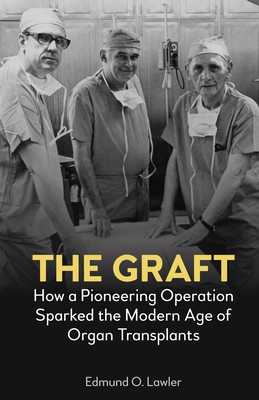
- Išsiųsime per 12–18 d.d.
- Autorius: Edmund Lawler
- Leidėjas: First Hill Books
- ISBN-10: 1785278347
- ISBN-13: 9781785278341
- Formatas: 14 x 21.6 x 1.1 cm, kieti viršeliai
- Kalba: Anglų
- Extra -15 % nuolaida šiai knygai su kodu: ENG15
Atsiliepimai
Aprašymas
In a community hospital in suburban Chicago run by Catholic nuns, surgeons performed an operation never done in the world before. The team at the Little Company of Mary Hospital led by Richard Lawler transplanted a kidney in 1950 from a just-deceased woman into the abdominal cavity of a 44-year-old woman.
Critics in the medical community called the operation irresponsible because immunosuppressant drugs that prevent the rejection of a transplanted organ had yet to be developed. Some Catholic clergy considered the transplant sacrilegious because it "desecrated" the sacred body of a dead woman when her kidney was removed. Yet the nuns who ran the hospital blessed the procedure.
Lawler said time alone would judge its success. Seventy years later, that transplant is largely lost to history--overshadowed by remarkable transplant surgeries and medical breakthroughs that have made life-saving kidney and other organ transplants almost routine. The book throws light on a seminal moment in medical history, offering new insights into the early days of human organ transplantation while also looking at the current national kidney crisis.
EXTRA 15 % nuolaida su kodu: ENG15
Akcija baigiasi už 4d.16:53:31
Nuolaidos kodas galioja perkant nuo 10 €. Nuolaidos nesumuojamos.

- Autorius: Edmund Lawler
- Leidėjas: First Hill Books
- ISBN-10: 1785278347
- ISBN-13: 9781785278341
- Formatas: 14 x 21.6 x 1.1 cm, kieti viršeliai
- Kalba: Anglų Anglų
In a community hospital in suburban Chicago run by Catholic nuns, surgeons performed an operation never done in the world before. The team at the Little Company of Mary Hospital led by Richard Lawler transplanted a kidney in 1950 from a just-deceased woman into the abdominal cavity of a 44-year-old woman.
Critics in the medical community called the operation irresponsible because immunosuppressant drugs that prevent the rejection of a transplanted organ had yet to be developed. Some Catholic clergy considered the transplant sacrilegious because it "desecrated" the sacred body of a dead woman when her kidney was removed. Yet the nuns who ran the hospital blessed the procedure.
Lawler said time alone would judge its success. Seventy years later, that transplant is largely lost to history--overshadowed by remarkable transplant surgeries and medical breakthroughs that have made life-saving kidney and other organ transplants almost routine. The book throws light on a seminal moment in medical history, offering new insights into the early days of human organ transplantation while also looking at the current national kidney crisis.


Atsiliepimai